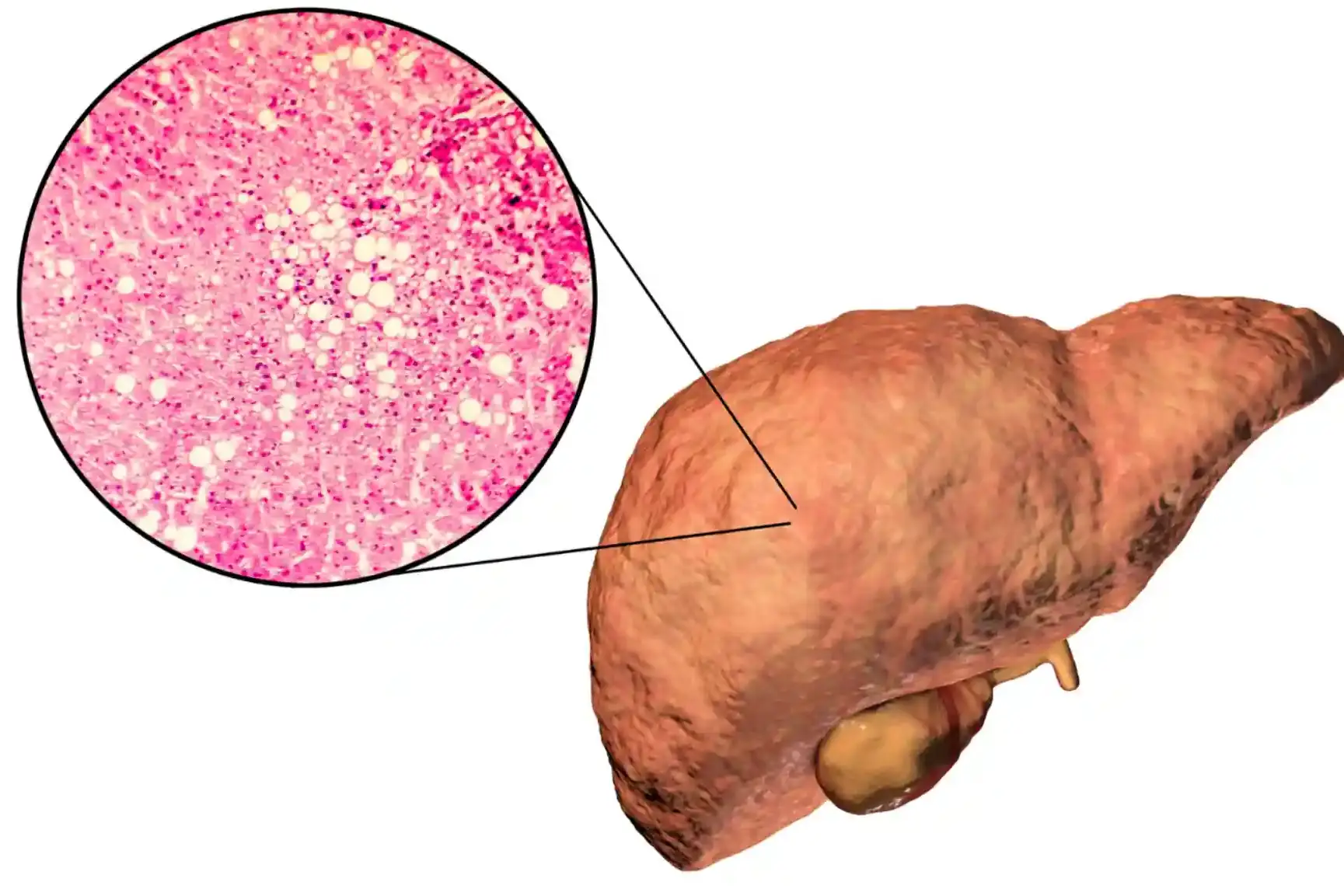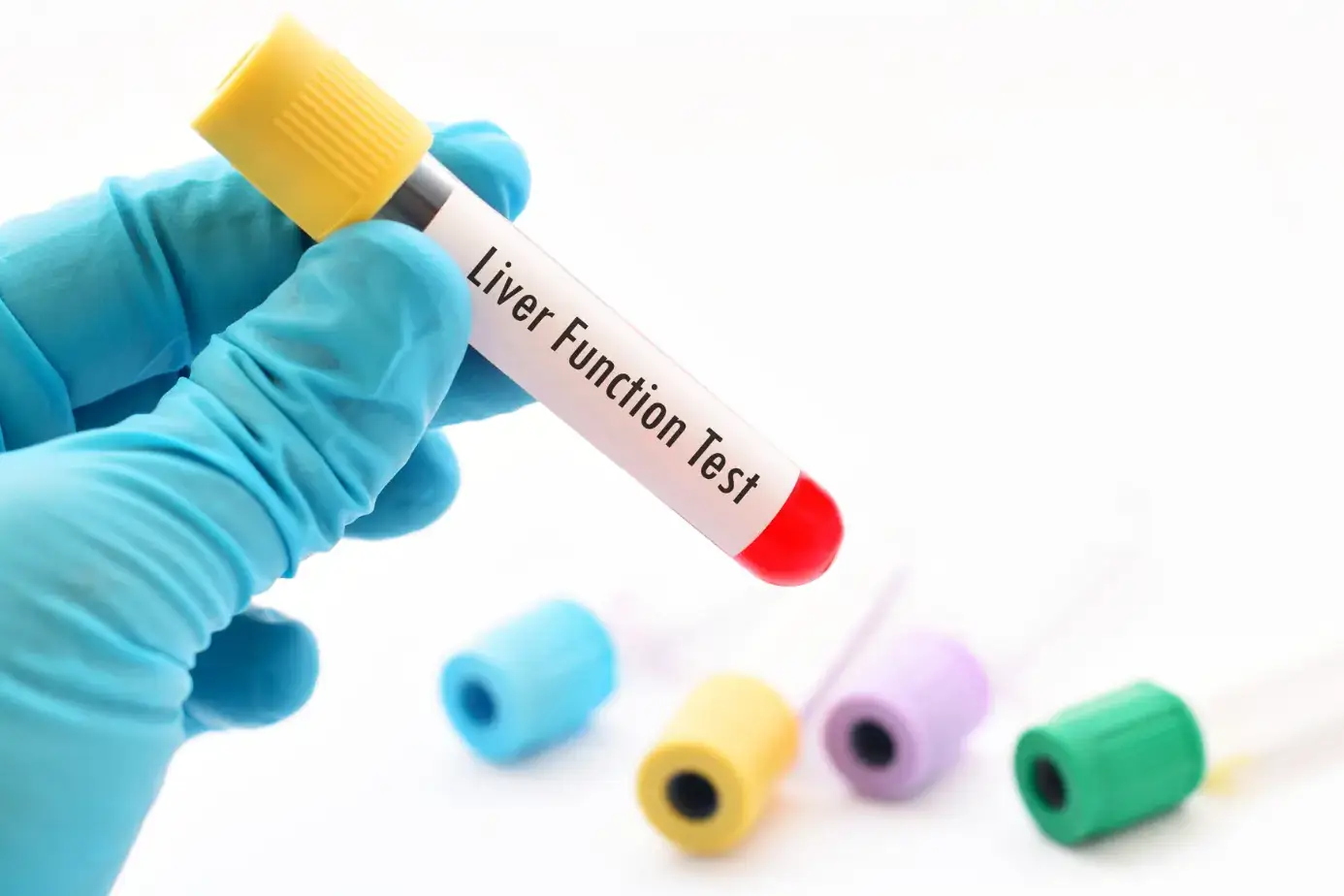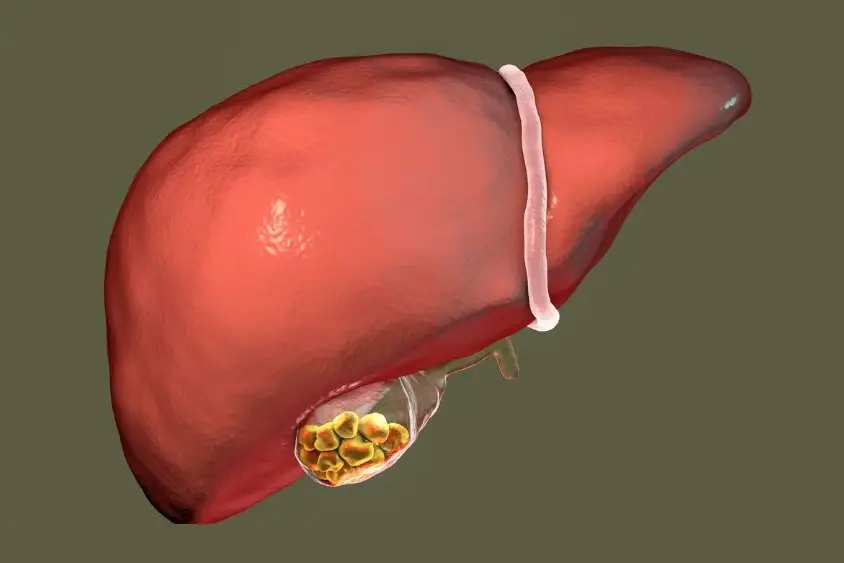Key Takeaways
Table of Contents
Toggle- Sign of liver cancer often appear late and may be subtle in the early stages
- Early signs of liver cancer include fatigue, weight loss, and abdominal discomfort
- Advanced stages bring jaundice, swelling, pain, and internal bleeding
- Early detection improves treatment options and survival rates significantly
What Is Liver Cancer?
Signs of liver cancer can be difficult to recognize because your liver continues working even when damaged. Liver cancer develops when abnormal cells in your liver multiply uncontrollably, forming tumors that interfere with normal liver function.
Primary liver cancer originates directly in liver cells. Hepatocellular carcinoma accounts for roughly 75% of primary liver cancers. Secondary liver cancer (metastatic) begins elsewhere in your body and spreads to the liver through your bloodstream.
Your liver has remarkable compensatory ability, which challenges in detecting signs of liver cancer . Your liver can function with only 25% of healthy tissue remaining. Only the liver’s thin outer membrane (called Glisson’s capsule) registers pain when stretched or irritated.
Liver tumors can grow silently for months or even years. By the time symptoms become noticeable, the cancer has often reached intermediate or advanced stages.
Early Signs of Liver Cancer
The early signs of liver cancer mimic common everyday complaints that are blamed on aging, stress, poor sleep, or minor illnesses.
Fatigue: You wake up feeling drained despite sleeping eight hours. Concentration becomes difficult by midday. This exhaustion happens because cancer cells consume enormous amounts of energy and nutrients.
Unexplained weight loss: You might drop 10 to 15 pounds over several months while eating normally. Tumors trigger inflammation throughout your body, which burns extra energy.
Loss of appetite develops gradually: Foods you previously enjoyed taste bland or unappealing. Your stomach feels full even when empty. This happens partly because the growing tumor presses against your stomach.
Mild upper abdominal discomfort below your right ribcage: You might notice it more after eating large meals or lying on your right side. You often mistake this for indigestion, gas, or muscle strain from exercise.
These liver cancer symptoms in early stages share characteristics with dozens of other conditions. Chronic fatigue could indicate anemia, thyroid problems, or depression. Weight loss might suggest diabetes or digestive disorders. Abdominal discomfort could point to gallstones, ulcers, or irritable bowel syndrome.
Signs of Liver Cancer as It Progresses
As tumors enlarge, signs of liver cancer become more distinctive and harder to dismiss. The cancer begins interfering noticeably with liver function and physically impacting surrounding structures.
Abdominal and Digestive Signs
Persistent right upper abdominal pain replaces earlier vague discomfort. The pain sharpens and becomes constant rather than intermittent.
Abdominal swelling develops when fluid accumulates in your peritoneal cavity (the space inside your abdomen). Your belly expands noticeably over weeks. Clothes around your waist become tight while the rest of your body may be losing weight. You might gain 10 to 20 pounds of fluid weight despite eating less.
Systemic and Physical Changes
Jaundice turns your skin and eye whites yellow or orange-tinted. The color change starts in your eyes and face, then spreads downward. Your urine becomes dark brown or tea-colored. Stools turn pale gray or clay-colored.
Itching (pruritus) can be severe and relentless, especially on your palms, soles, and at night. Scratching provides only temporary relief.
Easy bruising or bleeding happens from minor bumps that normally wouldn’t leave marks. You develop large purple bruises from light pressure. Nosebleeds occur frequently. Gums bleed when brushing teeth. Small cuts ooze blood for unusually long periods.
Fever appears periodically without any infection present. These fevers typically range from 100°F to 102°F. They come and go unpredictably.
Liver Cancer Pain Symptoms
Liver cancer pain symptoms have specific characteristics that distinguish them from other abdominal pain causes.
The liver parenchyma (internal tissue) lacks pain receptors. However, the liver capsule surrounding the organ contains dense nerve networks. When tumors grow large enough to stretch this capsule taut, sharp pain signals fire to your brain.
Liver cancer can grow into your diaphragm, causing pain with breathing. It can press on your abdominal wall muscles, creating sharp stabbing sensations. Tumors sometimes invade nerve bundles directly, producing burning or electric shock-like pain.
Most liver cancer pain symptoms concentrate in the right upper quadrant (the area below your right ribs). The pain may radiate to your back, specifically between your shoulder blades.
Difference between cancer pain and liver inflammation pain:Hepatitis or fatty liver disease typically causes diffuse, dull aching across your entire upper abdomen. The pain intensity remains relatively stable. Liver cancer pain tends to be more localized, sharper, and progressive. It steadily worsens over weeks or months rather than fluctuating day to day. |
What Causes Liver Pain in Liver Cancer?
What causes liver pain represents how the growing cancer affects surrounding tissues and structures.
Tumor growth stretching the liver capsule is the most common reason for liver cancer pain symptoms . The larger the tumor becomes, the more intense this stretching pain gets.
Capsular stretching creates pain that feels deep, constant, and aching. It worsens when you move suddenly, cough, or take deep breaths because these actions shift your liver position slightly. Lying on your right side can also intensify the pain by putting direct pressure on the stretched capsule.
Pressure on surrounding organs creates secondary discomfort patterns. Your liver shares space with your stomach, right kidney, intestines, and diaphragm. When it compresses your stomach, you feel fullness and nausea. Pressure on your diaphragm causes difficulty breathing deeply and pain that shoots to your shoulder.
Your liver also sits against major blood vessels , including the inferior vena cava (your body’s largest vein). Tumors pressing on blood vessels can cause dull, throbbing pain that matches your heartbeat. This vascular pressure sometimes creates swelling in your legs.
Internal bleeding in advanced cases produces sudden, severe pain completely different from chronic aching. Your liver receives about 25% of your total blood flow every minute. When a tumor breaks through a blood vessel wall, blood spills into your abdominal cavity.
This type of bleeding (hemoperitoneum) causes sharp, stabbing pain that comes on within minutes. Your abdomen becomes rigid and tender. You may feel dizzy or lightheaded from blood loss. Your heart races trying to compensate. Internal bleeding represents a life-threatening emergency requiring immediate surgery to stop the hemorrhage.
When Are Liver Cancer Symptoms a Medical Emergency?
Certain signs of liver cancer demand immediate emergency room evaluation. These symptoms indicate complications that can become fatal within hours if untreated.
Sudden severe pain that strikes without warning and doesn’t ease up signals potential tumor rupture or internal bleeding. This pain differs completely from your usual discomfort. It makes you unable to stand up straight or find any comfortable position. You may break out in cold sweats or feel faint.
Vomiting blood appears either bright red or dark brown like coffee grounds. Bright red blood indicates active bleeding happening right now. Coffee ground appearance means blood has been partially digested by stomach acid.
Rapid abdominal swelling that develops over just hours or a few days rather than weeks. Your belly becomes noticeably larger and tight.
Severe jaundice combined with confusion represents hepatic encephalopathy, a condition where your failing liver cannot remove toxins from blood. You become disoriented, can’t think clearly, or act confused about where you are. In severe cases, you may lose consciousness. This progression can happen within 24 to 48 hours.
Additional red flags include black, tarry stools (indicating upper digestive bleeding), difficulty staying awake, extreme weakness preventing you from standing, or fever above 103°F with shaking chills. These symptoms combined with known signs of liver cancer require immediate medical intervention.
Liver Cancer Pain Treatment
Liver cancer pain treatment focuses on controlling discomfort while addressing the underlying cancer.
Oncologists manage cancer treatment. Pain specialists or palliative care teams focus specifically on symptom control. These teams work together, adjusting treatments based on how you respond.
Pain management as part of cancer care starts with assessing your pain level, location, and triggers.
- Mild pain responds to acetaminophen or NSAIDs (though NSAIDs require caution with liver disease).
- Moderate pain may need tramadol or codeine.
- Severe pain requires stronger opioids like morphine or oxycodone.
Doctors prescribe these carefully because your damaged liver may process medications differently.
Nerve pain specifically benefits from medications like gabapentin or pregabalin. Some patients need combinations of different drug types for complete relief.
- Non-medication approaches include nerve blocks, where doctors inject anesthetic near specific nerves carrying pain signals from your liver.
- Radiation therapy shrinks tumors pressing on pain-sensitive structures. Even when it doesn’t cure cancer, radiation often reduces pain significantly.
Treating the underlying tumor provides the most effective liver cancer pain treatment long-term.
- Surgery to remove tumors eliminates the source of pain completely if cancer is caught early enough.
- When surgery isn’t possible, ablation techniques destroy tumors using heat, cold, or alcohol injections. This shrinks tumors and relieves capsular stretching.
- Transarterial chemoembolization (TACE) delivers chemotherapy directly to tumor blood vessels while blocking those vessels. This starves tumors and shrinks them, reducing pain.
- Targeted therapy drugs block specific proteins cancer cells need to grow. As tumors respond and shrink, pain decreases.
FAQs About Signs of Liver Cancer
What are the first signs of liver cancer?
The first signs of liver cancer include unexplained tiredness that doesn’t improve with rest, losing weight without trying, and decreased appetite where you feel full quickly. Mild right-side abdominal discomfort may appear. These symptoms seem ordinary, which makes early detection challenging.
Does liver cancer cause pain early?
No, liver cancer pain symptoms rarely occur in early stages because small tumors don’t stretch the liver’s outer capsule where pain nerves are located. Pain typically signals that cancer has grown large enough to put pressure on surrounding structures or has reached advanced stages.
Is jaundice an early sign of liver cancer?
Jaundice is not an early sign of liver cancer . Yellow skin and eyes appear in later stages when tumors block bile ducts or when liver damage becomes extensive. Early-stage liver cancer usually causes no visible skin changes. Jaundice indicates significant liver function impairment.
Can liver cancer be symptom-free?
Yes, liver cancer frequently produces no symptoms in early stages. Liver cancer gets discovered accidentally during imaging tests for unrelated problems. This silent progression makes screening crucial for high-risk individuals with hepatitis or cirrhosis. Symptom-free cancer can still be growing and spreading.
Does liver cancer always occur in cirrhosis?
No, though cirrhosis from any cause dramatically increases risk. About 80% of liver cancers develop in cirrhotic livers, but 20% occur in non-cirrhotic livers. Chronic hepatitis B can cause liver cancer without cirrhosis developing first. Other risk factors exist beyond scarring.
Is liver cancer pain severe?
Liver cancer pain symptoms vary widely from person to person. Small tumors may cause no pain. Moderate-sized tumors create dull, persistent aching. Large or rapidly growing tumors produce severe, sharp pain requiring strong medications. Pain severity doesn’t always match cancer stage.
Should mild symptoms be ignored?
Mild signs of liver cancer deserve medical attention if they persist beyond three weeks or worsen gradually. Combined symptoms like fatigue, weight loss, and appetite changes warrant evaluation even when mild. Early investigation catches cancer at more treatable stages.
Can early detection improve outcomes?
Early detection transforms liver cancer pain treatment options and survival dramatically. Five-year survival exceeds 30% when caught early versus under 5% for advanced cancer. Small tumors can be surgically removed or destroyed completely. More treatment choices exist before cancer spreads beyond the liver.
About The Author

Medically reviewed by Dr. Nivedita Pandey, MD, DM (Gastroenterology)
Dr. Nivedita Pandey is a U.S.-trained gastroenterologist and hepatologist with extensive experience in diagnosing and treating liver diseases and gastrointestinal disorders. She specializes in liver enzyme abnormalities, fatty liver disease, hepatitis, cirrhosis, and digestive health.
All content is reviewed for medical accuracy and aligned with current clinical guidelines.





